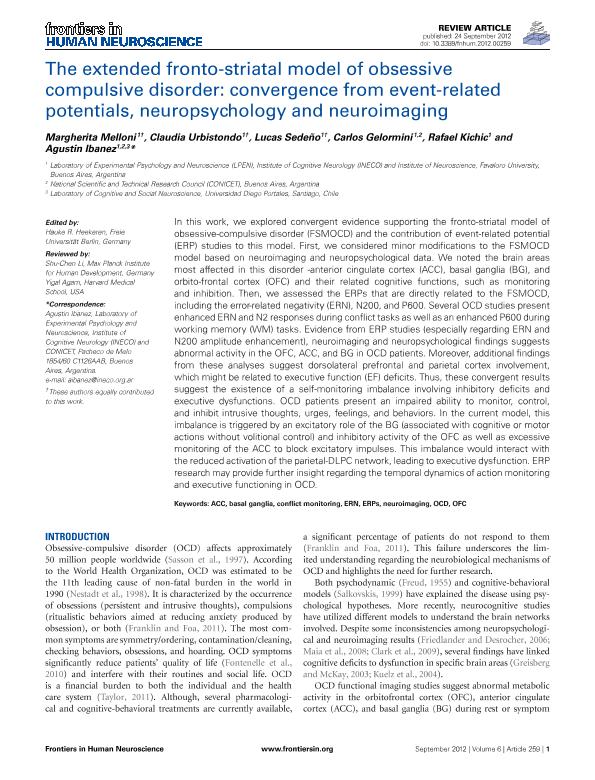Mostrar el registro sencillo del ítem
dc.contributor.author
Melloni, Margherita

dc.contributor.author
Urbistondo, Claudia

dc.contributor.author
Sedeño, Lucas

dc.contributor.author
Gelormini Lezama, Carlos

dc.contributor.author
Kichic, Rafael

dc.contributor.author
Ibañez, Agustin Mariano

dc.date.available
2023-05-16T13:15:50Z
dc.date.issued
2012-09
dc.identifier.citation
Melloni, Margherita; Urbistondo, Claudia; Sedeño, Lucas; Gelormini Lezama, Carlos; Kichic, Rafael; et al.; The extended fronto-striatal model of obsessive compulsive disorder: convergence from event-related potentials, neuropsychology and neuroimaging; Frontiers Research Foundation; Frontiers In Human Neuroscience; 6; 9-2012; 1-24
dc.identifier.issn
1662-5161
dc.identifier.uri
http://hdl.handle.net/11336/197671
dc.description.abstract
In this work, we explored convergent evidence supporting the fronto-striatal model of obsessive-compulsive disorder (FSMOCD) and the contribution of event-related potential (ERP) studies to this model. First, we considered minor modifications to the FSMOCD model based on neuroimaging and neuropsychological data. We noted the brain areas most affected in this disorder -anterior cingulate cortex (ACC), basal ganglia (BG), and orbito-frontal cortex (OFC) and their related cognitive functions, such as monitoring and inhibition. Then, we assessed the ERPs that are directly related to the FSMOCD, including the error-related negativity (ERN), N200, and P600. Several OCD studies present enhanced ERN and N2 responses during conflict tasks as well as an enhanced P600 during working memory (WM) tasks. Evidence from ERP studies (especially regarding ERN and N200 amplitude enhancement), neuroimaging and neuropsychological findings suggests abnormal activity in the OFC, ACC, and BG in OCD patients. Moreover, additional findings from these analyses suggest dorsolateral prefrontal and parietal cortex involvement, which might be related to executive function (EF) deficits. Thus, these convergent results suggest the existence of a self-monitoring imbalance involving inhibitory deficits and executive dysfunctions. OCD patients present an impaired ability to monitor, control, and inhibit intrusive thoughts, urges, feelings, and behaviors. In the current model, this imbalance is triggered by an excitatory role of the BG (associated with cognitive or motor actions without volitional control) and inhibitory activity of the OFC as well as excessive monitoring of the ACC to block excitatory impulses. This imbalance would interact with the reduced activation of the parietal-DLPC network, leading to executive dysfunction. ERP research may provide further insight regarding the temporal dynamics of action monitoring and executive functioning in OCD.
dc.format
application/pdf
dc.language.iso
eng
dc.publisher
Frontiers Research Foundation

dc.rights
info:eu-repo/semantics/openAccess
dc.rights.uri
https://creativecommons.org/licenses/by-nc-sa/2.5/ar/
dc.subject
OCD
dc.subject
FRONTOSTRIATAL MODEL
dc.subject
ACC
dc.subject
SELF-MONITORING
dc.subject.classification
Otras Ciencias de la Salud

dc.subject.classification
Ciencias de la Salud

dc.subject.classification
CIENCIAS MÉDICAS Y DE LA SALUD

dc.title
The extended fronto-striatal model of obsessive compulsive disorder: convergence from event-related potentials, neuropsychology and neuroimaging
dc.type
info:eu-repo/semantics/article
dc.type
info:ar-repo/semantics/artículo
dc.type
info:eu-repo/semantics/publishedVersion
dc.date.updated
2023-05-15T13:07:54Z
dc.journal.volume
6
dc.journal.pagination
1-24
dc.journal.pais
Suiza

dc.description.fil
Fil: Melloni, Margherita. Instituto de Neurología Cognitiva. Laboratorio de Psicología Experimental y Neurociencia; Argentina. Consejo Nacional de Investigaciones Científicas y Técnicas; Argentina
dc.description.fil
Fil: Urbistondo, Claudia. Instituto de Neurología Cognitiva. Laboratorio de Psicología Experimental y Neurociencia; Argentina. Consejo Nacional de Investigaciones Científicas y Técnicas; Argentina
dc.description.fil
Fil: Sedeño, Lucas. Instituto de Neurología Cognitiva. Laboratorio de Psicología Experimental y Neurociencia; Argentina. Consejo Nacional de Investigaciones Científicas y Técnicas; Argentina
dc.description.fil
Fil: Gelormini Lezama, Carlos. Instituto de Neurología Cognitiva. Laboratorio de Psicología Experimental y Neurociencia; Argentina. Consejo Nacional de Investigaciones Científicas y Técnicas; Argentina
dc.description.fil
Fil: Kichic, Rafael. Instituto de Neurología Cognitiva. Laboratorio de Psicología Experimental y Neurociencia; Argentina. Consejo Nacional de Investigaciones Científicas y Técnicas; Argentina
dc.description.fil
Fil: Ibañez, Agustin Mariano. Instituto de Neurología Cognitiva. Laboratorio de Psicología Experimental y Neurociencia; Argentina. Consejo Nacional de Investigaciones Científicas y Técnicas; Argentina. Universidad Diego Portales; Chile
dc.journal.title
Frontiers In Human Neuroscience

dc.relation.alternativeid
info:eu-repo/semantics/altIdentifier/url/http://www.frontiersin.org/Human_Neuroscience/10.3389/fnhum.2012.00259/abstract
dc.relation.alternativeid
info:eu-repo/semantics/altIdentifier/doi/http://dx.doi.org/10.3389/fnhum.2012.00259
Archivos asociados
